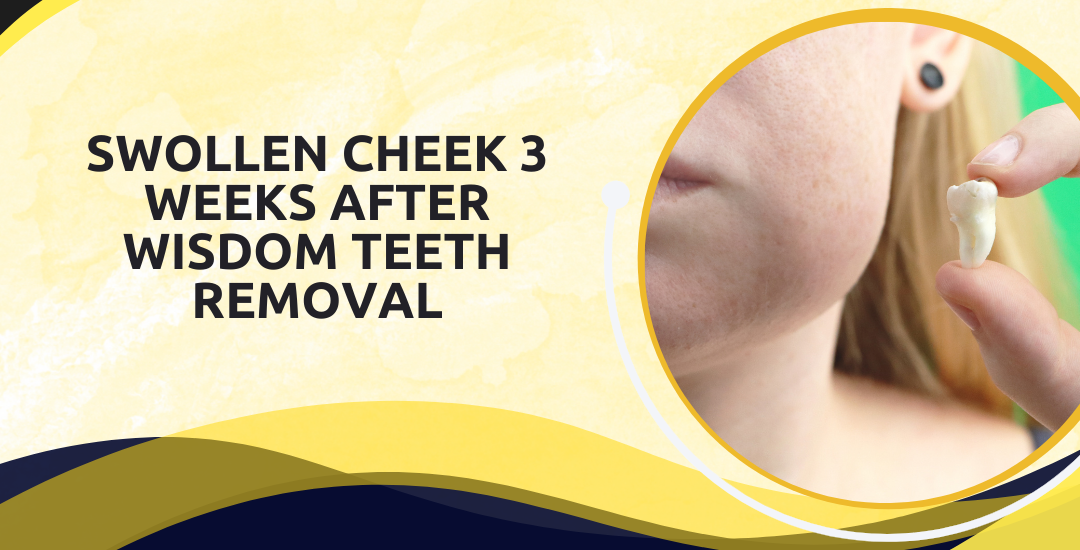 Have your wisdom teeth been removed, but you still notice a Swollen Cheek 3 Weeks after wisdom teeth removal ? It can be worrying and uncomfortable. While some swelling is normal right after surgery, prolonged puffiness or discomfort isn’t something you should ignore.
Have your wisdom teeth been removed, but you still notice a Swollen Cheek 3 Weeks after wisdom teeth removal ? It can be worrying and uncomfortable. While some swelling is normal right after surgery, prolonged puffiness or discomfort isn’t something you should ignore.
Dr. Jahnavi Patel, a highly experienced dentist in South Bopal, has helped many patients navigate such concerns. Known for her expertise, she takes a detailed approach to identifying and resolving post-surgical complications. At Dentafix Dental Clinic, she ensures every patient receives personalized attention to their dental health issues.
In this blog, Dr. Patel shares her insights on why a swollen cheek might persist weeks after wisdom teeth removal and when to seek help.
Let’s dive into the potential causes of prolonged swelling.
Swollen Cheek 3 Weeks After Wisdom Teeth Removal: Is It Normal?
Swelling is a natural part of healing after wisdom teeth removal. Generally, it peaks within the first 2–3 days and gradually subsides over a week. It may not be normal if you are still experiencing noticeable swelling three weeks post-surgery. Persistent swelling often signals complications, such as infection or an underlying issue at the surgical site.
Causes of Swollen Cheek 3 Weeks After Wisdom Teeth Removal

Infection
Infections are one of the most common reasons for swelling weeks after surgery. A compromised surgical site can allow bacteria to enter, leading to inflammation.
Pericoronitis
If the wisdom tooth had partially erupted, the gum tissue surrounding it may become inflamed, leading to pericoronitis. This condition can cause redness, swelling, and difficulty in chewing.
Impacted Food Particles
Food particles lodged in the surgical site can irritate the area, fostering bacterial growth and swelling. Proper cleaning techniques are crucial to prevent this issue.
Dry Socket
A dry socket develops when the blood clot that normally shields the extraction site is lost too early, either by dislodgement or premature dissolution. This leaves the underlying bone and nerves exposed, leading to significant pain, swelling, and slower healing.
Other Infections
General bacterial or fungal infections near the surgical site may also be to blame. Poor oral hygiene during recovery can increase this risk.
Nerve Damage
In rare cases, the swelling may be due to nerve irritation or damage during the procedure. This often presents alongside tingling, numbness, or unusual sensations in the affected area.
Underlying Medical Conditions
Certain conditions, like diabetes or compromised immunity, can impair healing, causing prolonged inflammation.
Concerned about prolonged swelling? Schedule a consultation with a dentist today for expert evaluation and care.
Could your swelling be a sign of something more serious? Scroll on to find out.
Signs and Symptoms of Potential Complications

Persistent swelling isn’t the only sign to watch for. Below are symptoms that may indicate a serious issue.If you’re dealing with swelling after wisdom tooth extraction along with the following symptoms, it’s time to consult a dentist immediately.
Severe, Persistent Pain
Pain that worsens or doesn’t improve over time could point to a complication, such as a dry socket or infection.
Fever
A fever indicates your body is fighting an infection. If accompanied by swelling, it is essential to seek prompt care.
Difficulty Swallowing or Opening the Mouth
Limited mouth mobility, known as trismus, is sometimes linked to infections or trauma near the jaw joint.
Increased Swelling
While mild swelling is expected, worsening inflammation three weeks later should prompt a visit to your dentist.
Bad Breath or Foul Taste
A persistent bad taste or odor in your mouth may result from infection or debris in the surgical site.
Pus or Discharge from the Surgical Site
Any discharge, especially yellow or green pus, signals an infection requiring immediate dental attention.
When to Contact a Dentist
If you’re dealing with a Swollen Cheek 3 Weeks After Wisdom Teeth Removal, it’s important not to delay professional care.
Persistent swelling or other complications may require antibiotics, a deep cleaning of the surgical site, or further examination. Timely intervention can prevent worsening symptoms and promote faster recovery.
Don’t let swelling or pain disrupt your life. Book an appointment with a dental expert today for professional guidance and treatment.
How can you avoid complications in the first place? Let’s find out.
Preventing Prolonged Swelling

While some factors may be beyond your control, adhering to post-operative care guidelines can significantly reduce the risk of complications.
- Adhere to Post-Operative Instructions
Follow all advice from your dentist to promote proper healing.
- Medications: Take prescribed antibiotics and pain relievers as directed.
- Oral Hygiene: To keep the area clean, gently rinse with salt water or a prescribed mouthwash. Avoid vigorous brushing near the site.
- Diet: Stick to soft foods and avoid hard, crunchy, or sticky foods that may irritate the site.
- Activity Level: Limit physical activity during recovery to avoid disrupting the surgical site.
- Monitor for Signs of Complications
Pay attention to any unusual symptoms, such as increased pain or discharge. Early detection can prevent minor issues from escalating.
Conclusion
Experiencing swelling after wisdom tooth extraction that lasts up to 3 weeks is not typical and may signal a complication. Timely diagnosis and treatment are crucial to ensure proper healing. You can minimize the risk of prolonged issues by staying vigilant, adhering to post-operative care, and seeking professional help when needed. You can visit an experienced dentist like Dr. Jahnavi Patel for comprehensive care and expert advice.
Have concerns about your recovery? Contact a dental clinic today to book an appointment.
Frequently Asked Questions:
How long should swelling last after wisdom teeth removal?
Swelling peaks within 2–3 days and subsides after 7–10 days. Swelling lasting beyond two weeks may require professional evaluation.
What can I do to reduce swelling after wisdom teeth removal?
Apply cold compresses during the first 48 hours. Maintain proper oral hygiene, stay hydrated, and eat soft foods to aid healing.
What are the signs of a dry socket after wisdom teeth removal?
Signs include severe pain radiating to the ear or temple, a visible empty socket, bad breath, and delayed healing.
What is pericoronitis, and how is it treated?
Pericoronitis is inflammation of the gum tissue around a partially erupted tooth. It’s treated with proper cleaning, antiseptic rinses, and, in severe cases, antibiotics.
Can you get an infection weeks after wisdom teeth removal?
Yes, infections can develop even weeks later if bacteria enter the extraction site or due to improper healing. Watch for symptoms like swelling, pain, fever, or pus.
Disclaimer: The information shared in this content is for educational purposes only and not for promotional use.





